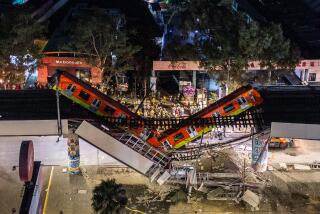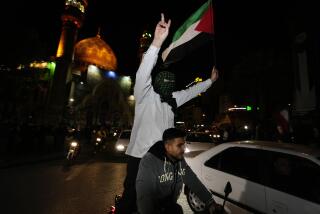Arabs unmoved by Bush visit
Even as smiling members of the Saudi royal family feted President Bush and his entourage this week, presenting the lame-duck leader with an ornamental sword, Saudi Arabia’s most prominent English-language daily stabbed him with a pen over his aggressive Iran policy.
“Whatever threat Iran may constitute, now or in the future, must be addressed peaceably and through negotiations,” said an unsigned editorial in Tuesday’s Arab News.
“In his confrontational remarks about Iran, [Bush] offers no carrot, no inducement, no compromise -- only the big U.S. stick,” it said. “This is not diplomacy in search of peace. It is madness in search of war.”
Bush and an entourage that included Secretary of State Condoleezza Rice, White House advisor Elliot Abrams and Chief of Staff Josh Bolten toured the Middle East in recent days to hasten long-dormant Israeli-Palestinian peace talks, reinvigorate the administration’s agenda to spread democracy, and forge an alliance of friendly states against Iran’s regional aspirations and nuclear program.
But though Bush may have persuaded a Persian Gulf bank to curtail business dealings with Tehran, analysts say they’re skeptical that the president managed to shift the momentum in the Middle East.
“All the politicians give [Bush] a very beautiful smile and give him a medal,” said Turki Rasheed, a businessman in Riyadh, the Saudi capital, who runs a nonprofit civic organization called Saudi Election. “But following Bush is a kiss of death. Anyone who goes with that kind of philosophy is out of the race.”
Bush’s visit coincided with fresh Israeli attacks in the Gaza Strip and Palestinian rocket strikes on southern Israel. Images of bloodied and crying Palestinian children being rushed to hospitals flickered across Arab news channels.
As Bush arrived in the Persian Gulf region, Al Jazeera, the Qatar-based pan-Arab television station, aired a live hourlong interview with Iranian Foreign Minister Manouchehr Mottaki, who railed against the United States. A couple of days later, the Kuwaiti foreign minister arrived in Tehran.
“My country knows who is our friend and who is our enemy,” Sheik Mohammed Sabah Salem Sabah told reporters Wednesday. “Iran is our friend.”
Analysts say Bush got a mixed response from Arab leaders on his three top issues: He received encouragement in promoting Arab-Israeli peace, he was ignored on the expansion of democratic rights, and he was firmly rebuffed on confronting Iran.
“Bush has essentially one way of solving problems, which is head-on confrontation,” Marina Ottaway, director of the Middle East program at the Carnegie Endowment for International Peace, said in a telephone interview from Bahrain. “The message that he got from Saudi Arabia and the United Arab Emirates is, essentially, that’s not the way we’re going to deal with the Iran problem.”
Though Bush administration officials downplayed Saudi Arabia’s invitation to Iranian President Mahmoud Ahmadinejad to attend the recent hajj pilgrimage in Mecca, the kingdom, under the independent-minded rule of King Abdullah, has been pursuing diplomatic initiatives in cooperation with Iran for nearly a year.
“They have a very strong feeling that they are neighbors with Iran, and as such they have to build somewhat positive relationships,” said Michel Makinsky, a Middle East expert at the Poitiers School of Business Management in France.
Bahrain’s Ahli United Bank, which has strong ties to Tehran, has told the Reuters news agency that it has suspended business with Iran as a result of the Bush visit. For months, there have been indications that more gulf banks and businesses with interests in the U.S. might also curtail ties to Iran, which relies on the region’s banking system to finance exports and imports.
Overshadowing Bush’s trip to the Middle East was the legacy of Iraq, the one regional hot spot the president didn’t visit or forcefully address during his eight-day trip. Though Iraq has receded as a leading issue in the American presidential campaign, it remains a sore point in the Mideast.
Arab leaders worry that they’ll be left to address unforeseen consequences of any other Bush administration initiative, whether in the Palestinian territories or Iran, analysts said. As a consequence, they’re hedging bets, seeking out additional Western powers for support. During Bush’s visit, Saudi Arabia, the United Arab Emirates and Qatar also invited French President Nicolas Sarkozy.
“They’re sending signals that they’re diversifying their support,” Ottaway said. “There’s a real concern. It’s not just playing games. There’s a real concern as to whether the U.S. can provide a security umbrella.”
--
More to Read
Start your day right
Sign up for Essential California for news, features and recommendations from the L.A. Times and beyond in your inbox six days a week.
You may occasionally receive promotional content from the Los Angeles Times.






